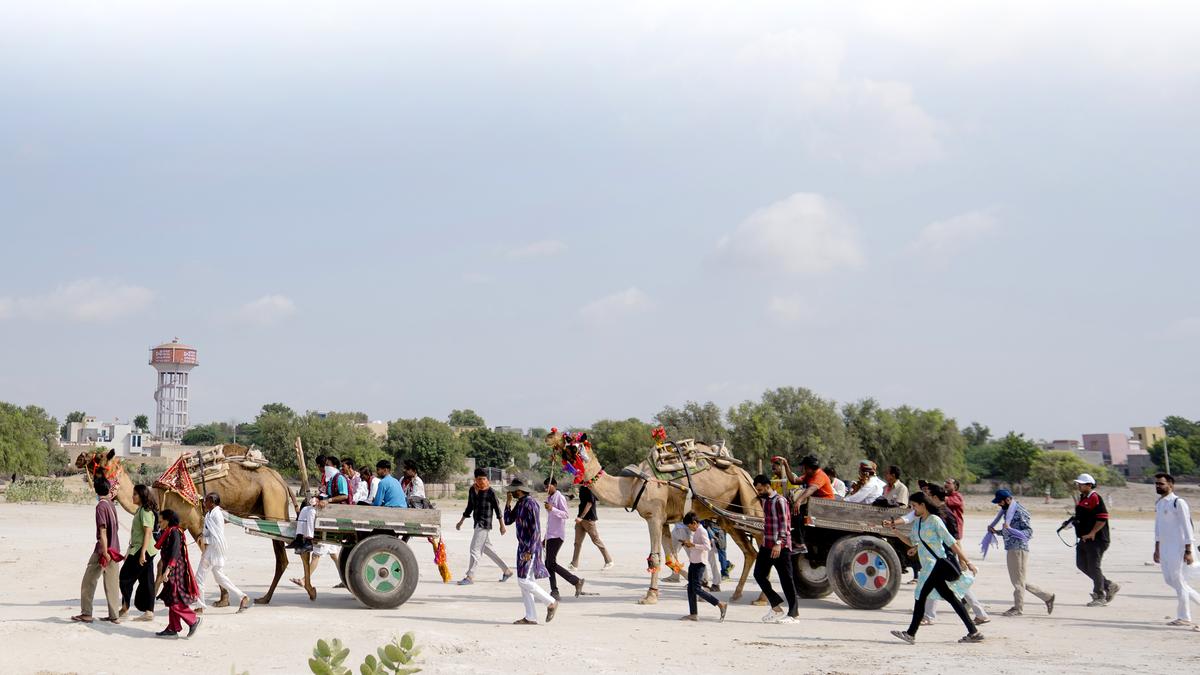A flush of hot steam-like air hits the face as we exit the tiny Bikaner airport. Then, a long drive to Chattargarh takes us to the eighth edition of the Rajasthan Kabir Yatra (RKY) 2025, organised by Malang Foundation and the district administration of Bikaner. Held every year between October 1 and 5, the RKY is the longest travelling folk music festival, which breaks down the wall between the artiste and the audience. While urbanites and foreign nationals become yatris to get a taste of the rustic life, folk art, food and culture, villagers get to interact with the city-bred — fostering an exchange of ideas, lifestyles and traditions.
Folk singer Kaluram Bamaniya
| Photo Credit:
Courtesy: RKY
Though Kabir was the most celebrated mystic of the yatra, saint-poets such as Mirabai, Gorakhnath, Bulleh Shah, Amir Khusrau, Shah Latif and others too were brought to life by the folk artistes. The yatra also broke barriers of class, caste and creed, making the very essence of Kabir’s teachings a lived experience. The five-day festival was packed with performances — from impromptu dance and satsang sessions that set the tone each day to concerts by artistes such as Dayaram Saroliya, Vasu Dixit Collective, Kabir Cafe, Rama Kumari of Kabir Folk Tapestry, Vedanth Bharadwaj and Kaluram Bamaniya.
Most of the audience danced like whirling dervishes during the performances, while villagers watched the shows perched on tractors and motorbikes. The local residents were awestruck by the enthusiastic response of the visitors.
Vasu Dixit on stage
| Photo Credit:
Courtesy: RKY
“Rajasthan Kabir Yatra is a community-driven festival,” said Gopal Singh Chauhan, who launched the initiative. “Villagers are an integral part of the project and wholeheartedly involve themselves in the arrangements. Their participation makes it easy for us,” he added.
Often a dusty ground is converted into a makeshift stage with lights, floral decoration and an elaborate sound system. A little away from the performance space, villagers are busy cooking Rajasthani dishes such as gatte ki sabzi, kadi chawal, panchratna dal and more. There is an endless supply of chai with a strong aroma of ginger.
When family tractors turned into auditorium
| Photo Credit:
Special Arrangement
While most of the artistes stuck to presenting the works of the mystic poets in folk form, Karnataka’s Vasu Dixit presented Purandaradasa kritis too. Vasu began his show by stating that his music is “different from the folk music Rajasthan has heard. As he explained the use of modern orchestral arrangement in his music, he requested the audience not to refer to all South Indians as Madrasis. “There are four states in South India, each with its own language, culture and cuisine,” he said.
“Vasu is popular with the local crowd and this is also our way of bringing something unique for the people here,” said Gopal, who also has made the yatra free for the localites, while the yatris from across the globe have to register and pay. “This is to take care of the logistics,” he shared.
The crowd breaking into a dance
| Photo Credit:
Courtesy: RKY
Amongst the yatris were also three Japanese students — Haruka Yamamoto, Serina Mori and Michiko Tomida — from The University of Osaka. “We first heard about the yatra in Japan, when we attended the Osaka edition of RKY. But here the yatra is huge,” said Haruka.
Kaluram Bamaniya, who never dreamt of performing on stage, learnt music by just listening to his father and grandfather sing. “To me, the yatra signifies the journey of life. It is a blessing to present my music as a prashad to the yatris,” he said.
Folk singer Mooralala Marwada
| Photo Credit:
Courtesy: RKY
Kaluram believes that Kabir is more relevant today than ever. “The yatra upholds similar principles —irrespective of form, instrument or language, it brings forth the essence and the emotions of the mystic poets to celebrate humanity.” During one of the morning impromptu sessions, he sang, ‘Mann mast hua fir kya bole’, weaving in messages about mastering the wandering mind. He also shared personal anecdotes. This was followed by Kabir’s ‘Dheere dheere gaadi hanko mere ram…’ and ‘Satguru ne mera bharam tod diya’. The mystic-poet continued to dominate the morning session as Purushottam Kaka sang ‘Prem nagar matt ja musafir’ sitting under a large tree and surrounded by a small group of yatris who listened in rapt attention.
A performance by Mir Usman Ali from Mir Razak Ali’s ensemble
| Photo Credit:
Courtesy: RKY
What came as a breath of fresh air was a performance by Mehfil-e-Sama’a’s ‘Kabir in qawwali’. Interestingly, a member of this Kerala-based group began the concert by apologising for not being able to speak in Hindi. But, he instantly won over the crowd with his renditions in chaste Hindi and Urdu. They opened with a song dedicated to Krishna — ‘Kanhaiya yaad hai kuch bhi hamari’. It was unique to listen to bhajans in qawwali style.
While each performance was magical in its own way, Vedanth Bharadwaj’s voice had a lingering effect. Unlike others who used folk and contemporary instruments, Vedanth sang with just a guitar. When he rendered ‘Suno bhai sadho’, it sounded like a clarion call from Kabir.
Published – October 17, 2025 05:47 pm IST
